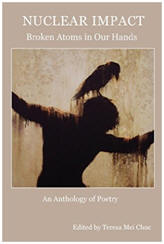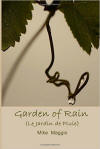
|
Nuclear Impact
Summer before last, observances of the 70th anniversary of the bombing of Hiroshima and Nagasaki brought back memories from early childhood, and I wrote a little poem. I never expected to show it to anyone, much less submit for publication. But Shabda Press announced it was compiling a poetry anthology on the impact of nuclear power, and my poem was accepted.
|
 |
||
Victory Garden
On the 70th anniversary of the bombing
of Hiroshima and Nagasaki
Daddy worked all day in town, then
took up hoe and spade to plant
a harvest worth of groceries
in our victory garden
I didn’t know what victory meant
why the window shades were black
why we didn’t have enough gas
to take a ride in the old Ford
or why Mother called it black market
when Mr. Orndorf drove in from the farm
bringing butter, eggs, and milk
in his battered pickup truck
We kids played Bombs Over Japan,
dropped rocks in the sand box, laughed
as grains exploded outwards, tiny
sprays of destruction
We didn’t know what devastation
would be sown, what toxic terror
the world would reap
from our victory
....................................................................................................................................
Why Poetry?
What’s the point of publishing poetry books when most sell a thousand at best? “The issue is larger than the number of collections of poetry sold each year,” says Daniel Halpern, himself a poet and the founder of Ecco Press. “It’s about the language—our language. Is it, too, [like an endangered species] endangered? If the depleted language of emails and texts and Twitter is any indication, then there’s a case to be made that it might be.”
Writing in the New York Times online Critic's Take, Halpern notes how common it is for people to turn to poetry for important rites of passage. Why? He suggests that the language of poetry both avoids the quotidian but simultaneously celebrates it. As poet W. S. Merwin once said, “Poetry addresses individuals in their most intimate, private, frightened and elated moments . . . because it comes closer than any other art form to addressing what cannot be said. In expressing the inexpressible, poetry remains close to the origins of language.”
Halpern quotes Emily Dickinson and other poets on the question and concludes: “Those of us who engage in the publication and sustenance of the written word do so to insure that language for our future generations remains intact, powerful and ultimately renewed, capable of its role during times of crisis and celebration.”
....................................................................................................................................
You Are Here
Welcome to
But Does it Rhyme?
We're a small, but
hopefully growing, band of poets who like to
talk about our craft and share what we've
written. We'll highlight favorite poets, review
new books, and explore the process of writing
poetry from inspiration to conclusion. (We might
venture into essays and short fiction, too.) We
hope you'll like our blog — and contribute your
own thought and poems.
Sally Zakariya, Poetry Editor
Richer Resources Publications
Charan Sue Wollard
(LivermoreLit)
Kevin Taylor
(Poet-ch'i)
Sherry Weaver Smith
(SherrysKnowledgeQuest)
INVITE US TO YOUR INBOX!
Would you like to receive our monthly newsletter? Sign up here.
| ARCHIVES |
|
Welcome to the Garden Garden of Rain, that is, the new collection of poems by Mike Maggio, a luminary in the Poetry Society of Virginia. Reviewers describe Maggio’s voice in these poems as “both refreshing and deeply disturbing” and call the collection “an existential quest” and “a wry voyage in which the sublime, like disaster, is always ahead and behind.” Here’s a poem from the book, one of Mike’s favorites: |
 |
||
The Master Fitter’s Apprentice
by Mike Maggio
My master fitter
I’ve seen your mannequins and pins, the way
a chestnut-stained fabric gently drapes your rigid
arm as you bend and crouch and. kneel. Here
in this enchanted room, filled with wicked possibilities,
I’ve watched you measure and cut, envied the soft cloth
passing through your firm fingers, coveted the barren form’s frigid
habit to welcome your tenuous touch. From this dark bitter
corner, where I gaze and await your command, I’ve furtively followed
the trace of your ring, now sparkling, now dull, a curious truce
between your secret eyes, resting briefly on my brazen shoulder,
and your heavy brow waxed by days and years of wonder and woe.
But for your bobbins, your buttons and lace
as wondrous as a Spanish galleon lost
underwater, crammed with gold and silver, muslin and aged tapestry
I would ask: what of the smile that once graced your face
the golden threads that wove the hushed yearnings bound beyond your distant eyes.
My master fitter, I will bring you bolts of cotton and silk, spools
of dappled velvet and sheer black satin. I will lay rolls of organza at your feet.
I will unfold the soft chiffon on your table and joyfully smooth it out for you
to render the silver stitches, the restive embroidery
that conceals your ruthless charm.
Look, my master: the moonlight, it stains your naked arm.
I feel a tremble rise up through your silken skin, and I fear
the wedding pleats are slowly ungathering
Mike writes prose as well. His novella The Appointment is due out in May from Vine Leaves Press.
.....................................................................................................................................
What Are You Writing?
Why should we get all the bylines? Submit your
latest poem—just one for now—and we’ll publish
the poems we like best in an upcoming blog post.
Simultaneous submissions are fine, but please
let us know if the poem is accepted or published
elsewhere. Send your poem, plus a few lines
about yourself, in the body of an e-mail message
to:
poetryeditor@RicherResourcesPublications.com
